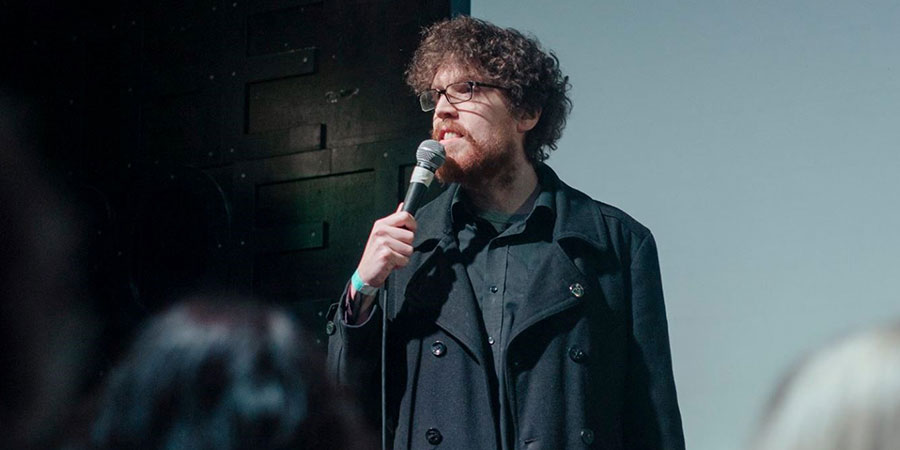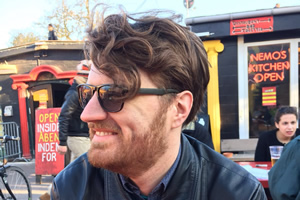Richard Brown interview

An interview with comedian Richard Brown, who has been performing his show You Are Not My Audience at the Edinburgh Festival.
Over the past three years your shows have gone through some changes...
Last year I was doing a show and thought that I could use a projector and a screen... and it turned out that I couldn't, so I had a real tech-heavy show that I couldn't perform. So this year I have decided to use no tech and no props I just walk up, I don't even have a bag with me. It's a huge relief.
Has this stripped-down style affected your routines?
This year there are just gags, with no emotional narrative running through it. If you have a narrative then people may not be reacting but they are engaging - but if people are not getting on board with the jokes then it's a long 50 minutes.
Have you found that you are tempted to move your set or change the order?
Yes - but I haven't yet. I've been doing tech for a show called Cat Pictures to Music for an Hour so the only variable in that is the audience! One day they had 40 in and they were whooping and cheering and having a great time; the other day there were 16 in and 14 walked out. If you are a performer and 14 people walk out you are likely going to change your show, but you shouldn't because the next day you may have people that are really on board with it. This year I am setting out my stall and saying that this is what I want to talk about. This is a joke that I find funny. This is what I'm doing.
Could you talk about your process and your commentary on society?
I really like satire, I like writing jokes about politics and politicians in general and I'm part of a comedy group called Chunks. We do a monthly night in Glasgow where acts can do anything to make people laugh - except stand-up - and they can't perform for more than three minutes.
It's on the last Monday of every month at McPhabbs in Glasgow and the premise is you can do anything that you want to make the audience laugh but you cant do stand-up. It was set up by Nev and Jamie Roland and if they had not set it up I would probably have been done with comedy a long time ago. It's been the most fun thing to be involved in.
The show two years ago with the robot, that all came from that night. If something is already fun then you don't need a comedian to tackle that issue - I like comics who take something horrible and try and make a joke out of it - not at the expense of it but because I think that's where the skill lies and you want to make people think about how horrible the world is. There is this great quote that the perfect gig for a buffoon clown is the audience thoroughly enjoy themselves, realise that their lives are meaningless, and then kill them selves. I love that. That's my goal.
I've got some stuff about David Bowie in this year's show too. I really like it when people message me saying my mates are now sitting in the pub questioning where you separate art and the artist.
I like it when people laugh at a thing and then go away and think about it. Where they are laughing and then just remembering that the world Is horrible.
Are there any acts that made you want to go down a particular comic path?
When I started in 2011 there were lots of comics that had the same influences: Dylan Moran, Stewart Lee, Simon Munnery; a lot of people were emulating them and I was as well. It took me a long time to find my own voice and it's ended up being so far removed from being what I thought I would be like as a comic.
When I started there where a lot of open spots. There were too many opens spots, which is known as the Kevin Bridges effect - people thought that you could just go up and talk about your life. They didn't realise that he is not just doing that; what he is doing is doing that well. I was dog shit for two years and in 2013 I did a two-hander and that's when I figured out what I was doing.
Dylan Moran's Monster was the first stand-up DVD that I bought and I watched that every night trying to dissect it.
I read something interesting about Moran, that he didn't go to university and so he read as much as he could because he was worried that someone would call him out on it.
That's really interesting because I dropped out of high school and started working in a factory, then moved to Glasgow and just started trying to learn more, read loads and know more about the world. The first set that I ever did I was reading from Twighlight as part of the set in my attempt to understand pop culture, because I don't really!
Is there a book that you would like to recommend?
House of Leaves. It's a book within a book and you have to turn it around to read it. I would be sitting on the couch reading it and my wife would just be laughing at me - which was nice! My show in 2014 was called This Is Not For You and the title for that came from the dedication inscription inside the book.
I like that in your shows that there is a deliberate uncomfortable air. How do you broach that?
As much as it comes across in my shows that I hate everyone; someone's taken 50 minutes out of their day to take a punt on me, because the chances are that they have never heard of me. I don't like a hostage-style environment unless it's done superbly well, but it rarely is. I want the audience to feel unsafe but know that they are.
Can you talk about your background?
I lived in the Scottish Borders until I was 18, and dropped out at 16 and spent two years working in a potato factory.
Do you consider yourself a Glaswegian comic?
Glasgow is very interesting because it's got this very hipster west end and then it's also got this proper Glasgow comedy scene. I don't really play to the crowds that want jokes about the likelihood of being stabbed, I don't like playing up to that stereotype. Class in comedy is being discussed quite a lot now - but I work two jobs on zero hour contracts so it's hard for me to go to other places to do gigs. I just want to do the comedy that I do at the Fringe.
The month before Edinburgh I took a month off and focused on the writing. Monkey Barrel comedy have a night called Project X every Tuesday and will give all of the comics a theme each week, which gives you a chance to write to a brief, so that forces me to write. I'm also in the writing pool for Breaking The News, so they send out the subject and if it does not get used then it can go in my show.
Would you like to give anybody a plug?
I'm doing tech for David Callaghan's show. The premise is an episode of Taggart that he directed in 1996. Also James Meehan, whose show is all about the working class. Generally when I see stuff about the working class it's lowest common denominator stuff, but this is the first show about being working class that I really found relatable as it was incredibly thoughtful and really funny. I don't really find observational material relatable but his was the first show that really spoke to me.
How would you describe being a working class comic?
Working two jobs on zero hour contracts and living pay cheque to pay cheque. The whole idea of who is working class is very complicated but the working class Fringe guide is specifically for people doing an Edinburgh run as a big risk. If I take a big financial hit I can't ring up my parents and ask for money.
Do you think that this reality affects your stage voice?
I think it comes across on stage that I hate doing it but that's not true. I love writing jokes. You have to not be bitter; reviewers have written in the past that I have come across as bitter. If it gets to the point where it is killing you then stop... or let it kill you because someone needs to do that show. British Comedy Guide asked some questions including 'what would you do if you had a gun with one bullet?': I said that I would end each performance by playing Russian roulette and giving one show the ending that it deserved.
The reason that I love the Fringe is that all year you are gigging and every gig that you do is bringing you one gig closer to your next spectacular death but the Fringe means that you are doing your gig up to two or three times a day, so you are just making those closer. You are getting through those quicker and that's what I like about it - and also I hope I don't come across as bitter. There are places for everyone in comedy.
Richard Brown: You Are Not My Audience was performed during the Edinburgh Festival Fringe 2018 at The Coffee House.
Help us publish more great content by becoming a BCG Supporter. You'll be backing our mission to champion, celebrate and promote British comedy in all its forms: past, present and future.
We understand times are tough, but if you believe in the power of laughter we'd be honoured to have you join us. Advertising doesn't cover our costs, so every single donation matters and is put to good use. Thank you.
Love comedy? Find out more
